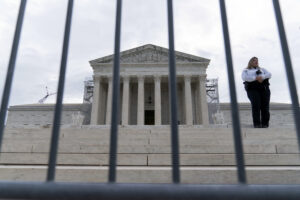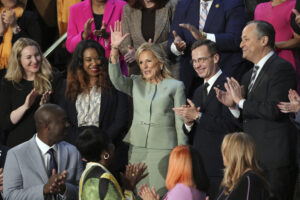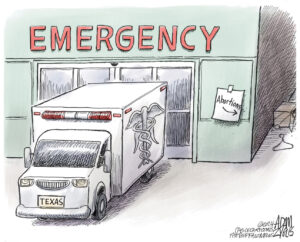Boycotting Obama at Notre Dame Is Vulgar Zealotry
In respect to tradition, one would expect Obama to deliver Notre Dame's commencement address in May, but a crowd of Fighting Irish have decided to try to keep the new president away from the hallowed campus for fear that some of his thinking might rub off on them.One might have thought that the election of Barack Obama as president of the United States had for the moment offered the chance of a settlement of the country’s great issues. Far from it. The controversy erupting from Treasury Secretary Timothy Geithner’s latest draft of his plan to save the world’s financiers, and thereby prevent the rest of us from economic disaster, has been the proof of that.
Lowering our sights, one might at least think that by electing Obama president we have decided who would deliver the University of Notre Dame’s commencement address in May. It has been the custom for a number of years for a new president to go to the country’s most eminent Roman Catholic university for the spring graduation ceremony; a courtesy, so to speak, to the country’s Roman Catholic electorate. When Ronald Reagan did it, it was also because half the country was convinced that he was the great Notre Dame halfback of the 1920s, George Gipp, not the mere actor who had played him in a movie (pleading from his deathbed that the team one day “win one for the Gipper.”)
Whether the real Gipper would have voted for the one-time Des Moines sports-broadcaster-become-president is another question; Notre Dame was an upwardly mobile middle-class university at the time, and in the Depression and immediate postwar years tended to vote Democratic.
The school was founded by French missionaries. The “Irish” nickname came under the Norwegian football coach Knute Rockne and “Irish” football players with names like Bertelli, Lujack, Sitko and Mastrioani, to name a few from my own days at the university.
A lot of graduates are now golf-club Republicans, which is harmless enough in most cases, though not all. A number of these folks and others have decided that they have to keep the new president of the United States away from the hallowed campus for fear that some of his thinking might rub off on them. On abortion, for example, where he is on the side of “choice.”
This stand turned many Catholic voters against him in the election, as well as clergy, including the bishop in whose diocese the University of Notre Dame is located, who declares that he won’t attend the commencement ceremony if President Obama is there.
One-issue politics has unfortunately become a rule in much of the United States. It includes a lot of people who should know better, but saves a lot of thinking. If I may be so presumptuous as to butt into the theological debate, I would suggest that political choice is always a matter of multiple judgment, and that few candidates are so lucky as to have one single stand to take that causes voters to endorse everything else they bother to say.
An irrelevant example. I was taught at Notre Dame (by a priest-teacher mumbling in embarrassment) that a good Catholic was required to oppose freedom of religion: that is, to oppose the U.S. Constitution. The orthodox position of the Church was that every government had a duty to command all citizens to “submit” to Catholicism as the one true church, and could only “tolerate false religions so long as they did not teach open immorality.” I wonder how many of my fellow graduates who are today Obama boycotters would like to go out today and run for political office on that platform?
So far as I know, none ever did, but the doctrine existed until Pope John XXIII’s Second Vatican Council in the mid-1960s (See Donald Attwater, “A Catholic Dictionary,” New York 1961.) It was changed only thanks to the American Jesuit John Courtney Murray, who managed to convince his fellow theologians that human rights are superior to arid logic.
I cite this not to embarrass the bishop of South Bend and my other fellow Catholics but to emphasize the old admonition, “not too much zeal” — zeal being a word that comes from zealot. This boycott of President Obama is vulgar zealotry, as well as discourtesy to the university.
Obama has just decided to continue prosecuting his predecessor’s “long” and fruitless war against Muslim religious extremists, a war that causes a lot of human misery to weigh up against the misery of abortion deaths — and worse, it is caused by active public policy, not legalization of private action.
Since my line of work is foreign affairs, I will do what is in my power to persuade the president, his policymakers and the electorate, as I tried to do when George W. Bush was in office, that this is disastrously mistaken policy, morally evil in its consequences.
I would do the same for abortion. But I do not think organized mass discourtesies and denigration of public officials and bodies of higher learning in the United States do anything but harm. The president of Notre Dame, the Rev. John Jenkins, and his clerical and lay colleagues have conducted themselves in this affair with high-mindedness and dignity, and I would think my fellow graduates and fellow Catholics would do well to save their views for the ballot box.
Visit William Pfaff’s Web site at www.williampfaff.com.
© 2009 Tribune Media Services Inc.
Your support matters…Independent journalism is under threat and overshadowed by heavily funded mainstream media.
You can help level the playing field. Become a member.
Your tax-deductible contribution keeps us digging beneath the headlines to give you thought-provoking, investigative reporting and analysis that unearths what's really happening- without compromise.
Give today to support our courageous, independent journalists.






You need to be a supporter to comment.
There are currently no responses to this article.
Be the first to respond.